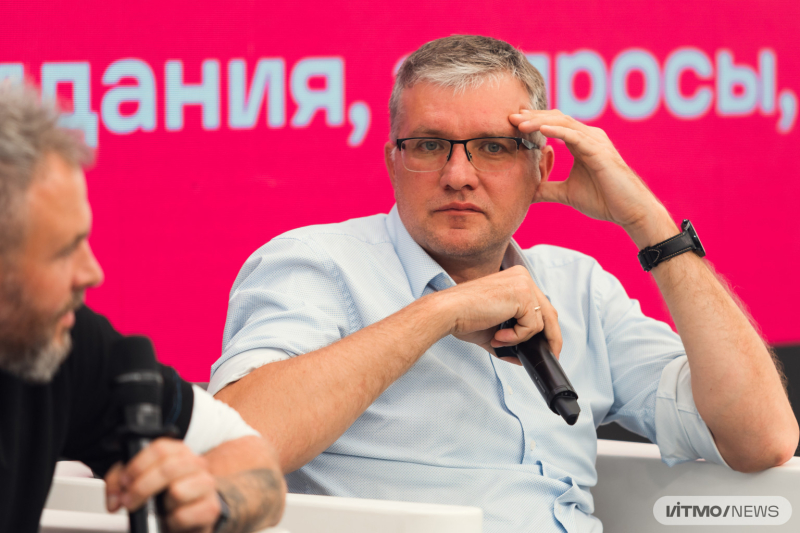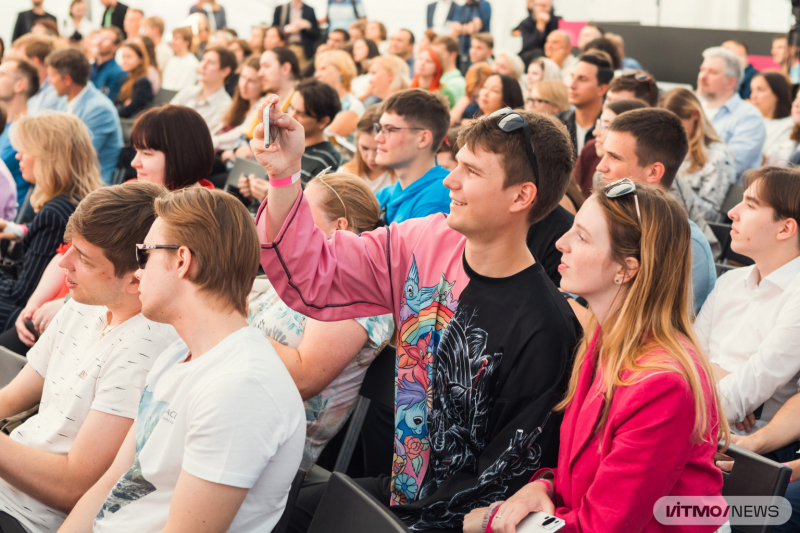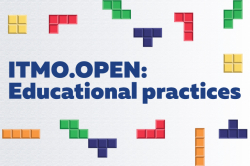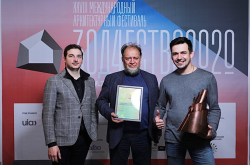This year, ITMO CONF was held at the site of ITMO Highpark – a world-class research, education, and innovation center currently under construction in the south of St. Petersburg. The 86-hectare site will soon become an ecosystem for generating knowledge and implementing the boldest ideas. The center will primarily teach Master’s and PhD students engaged in applied studies and their commercialization. Students and researchers will study and work at the center in close collaboration with representatives of medium and large businesses. The facility is expected to receive a formal status as an innovative science and technology center with concessions for high-tech businesses.
In her opening speech, Daria Kozlova, ITMO’s First Vice Rector and the head of its 2030 Development Strategy, noted that, though ITMO Highpark is still under construction, the university’s team has already adopted a new model of university-business collaborations.
“What makes us think that ITMO Highpark will be a success? First of all, we’re not starting anew, but rather moving forward with our 123-year history. We know what we lack and what we want the center to be. We’re also creating and testing a one-of-a-kind synthesis of industry, business, and education at our university. That’s why we designed ITMO Highpark to spark an interdisciplinary dialog within those fields. And, finally, we’re not waiting for the ribbon-cutting ceremony – we do it here and now. ITMO Highpark and the future are already here,” said Daria Kozlova.
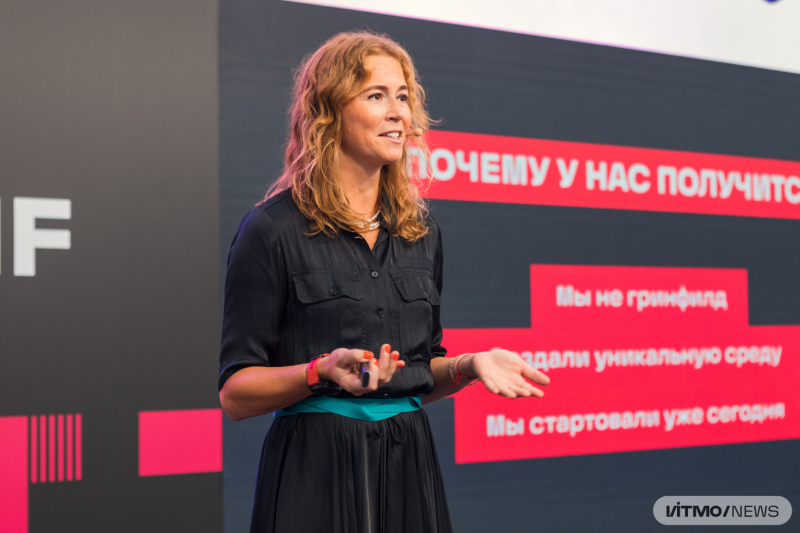
Daria Kozlova. Photo by Dmitry Grigoryev / ITMO.NEWS
Universities and startups: mutual benefits
The first and primary component of a research and educational corporation of the future is the community of students and researchers. At ITMO CONF, young entrepreneurs spoke about the prospects of their projects and the opportunities available to their peers at the university.
For instance, the team of the startup Nanoink is working on CIGS solar cells – thin-film (less than 5 microns in diameter) light and flexible solar technologies that can be used to produce modules of virtually any shape that, in turn, can be incorporated into finished products. As the manufacturing of CIGS solar cells is rather expensive, the researchers set out to make the technology more affordable by switching to printing technologies.
The startup launched a few years ago at ITMO’s School of Physics and Engineering. The researchers received the initial investment from the Fund for Infrastructure and Educational Programs (FIEP), while the necessary competencies, infrastructure, grants, and industrial partners were covered by ITMO University.
“Deeptech startups in their early stages need strong scientific expertise and experienced specialists – all of this can be provided by universities. One of the ways to scale up a startup when it lacks funding and business competencies is by going out there and joining accelerator programs. Accelerators, however, can also be held at universities. The fact that a startup was founded at a university alone builds hype around it and boosts its credibility. Universities, in turn, benefit from supporting such projects – they become more popular, as well as gain profit and intellectual property rights,” explained Nadezhda Yakubovskaya, an ITMO graduate and CMO at Nanoink.
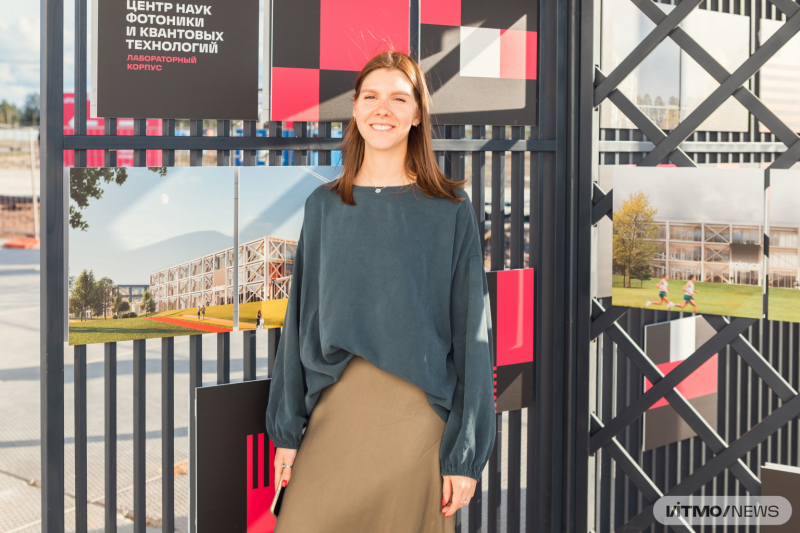
Nadezhda Yakubovskaya. Photo by Dmitry Grigoryev / ITMO.NEWS
Daudi Dauddin, an ITMO PhD student and the founder of Silkins (a startup for regenerative cosmetics made of spider silk) also stressed that apart from competencies, media coverage, and initial funding, the university connect young entrepreneurs with industrial partners and investors through, for instance, accelerators or demo days, where experts can test the viability of ideas and consult startup creators on how to build a business model.
Read also:
ITMO Accelerator Launches TechNet Track
25 ITMO Students Win 1-Million-Ruble Grants for Their Startups
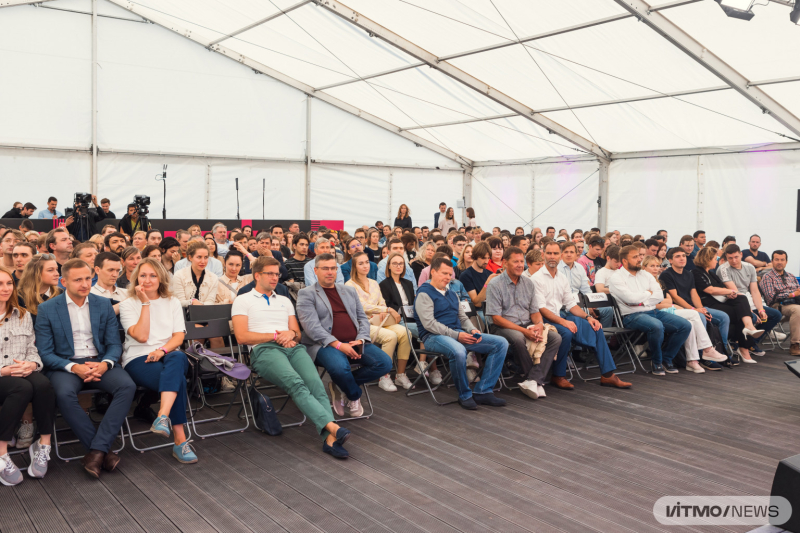
ITMO CONF 2023. Photo by Dmitry Grigoryev / ITMO.NEWS
Benefits for industry
Another component that makes up a corporation is a long-term partnership with industry leaders. Speakers Andrey Glazkov, the head of the HR Department at Tatneft, Anton Elistratov, the CEO of real estate company Samolet Group, and Ivan Khlebnikov, the executive director of Sberbank, elaborated on partnership strategies and benefits at ITMO CONF. The discussion was moderated by Maxim Spiridonov, the founder of Netology, an entrepreneur, and the director for transformation at ITMO.
“The world is changing, and organizations, including higher education institutions, that don’t understand it and can’t adjust to the changes grow obsolete and even unsafe. When people ask me if they should go to university, I always say “No.” But there are exceptions — and these are the top 10 or 20 universities, including ITMO,” stated Maxim Spiridonov.
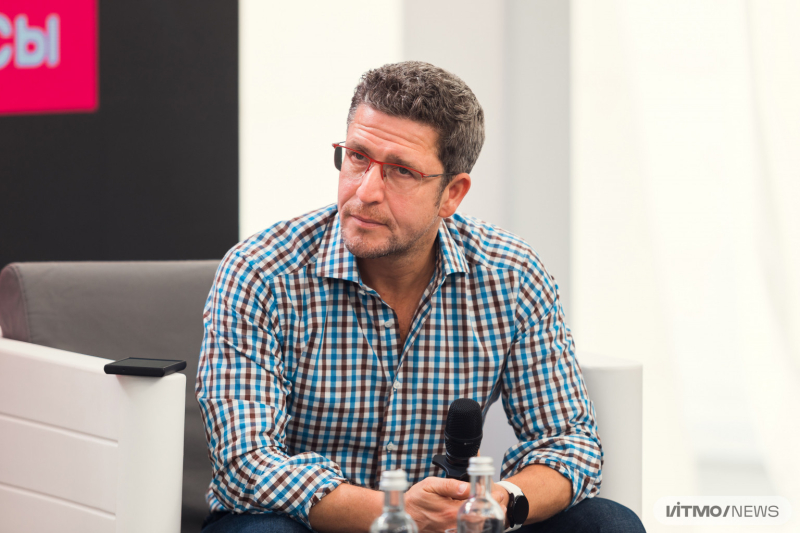
Maxim Spiridonov. Photo by Dmitry Grigoryev / ITMO.NEWS
So, how should universities keep up with changes and remain relevant? And how should they approach partnerships with businesses?
R&D projects. Ivan Khlebnikov believes that companies that have reached the limits of their own resources should seek assistance from the country’s leading universities. The dialog should be maintained by both parties: universities will need relevant tasks from companies and companies — research-backed solutions.
Unique specialists. Anton Elistratov shared a story of the time when Samolet Group required some top-grade IT specialists. The competition is fierce for this kind of expert, so corporations recruit future specialists among the distinguished students of universities and even schools. What can help the situation are partner faculties and joint educational programs.
At the same time, the market isn’t always booming with certain categories of professionals, and that’s when businesses have to team up with universities to address much-needed specializations, as well as offer their own expertise and real-life research cases and products. From the university's point of view, this is the way to educate students more about the company and promote it.
Growth. According to Andrey Glazkov, companies that want to expand need people who are ready to both accept changes and spearhead them, which can be achieved if universities and companies have comparable philosophies and values.
The examples of such successful collaborations are joint educational programs Sustainable Chemistry for Energy Technologies, Chemistry and Artificial Intelligence, and Artificial Intelligence in Biotechnical Systems, as well as training programs for PIs and PEs.
“Entrepreneurs alone can’t define what makes the specialist of the future, whereas universities can’t tell for sure which specialists will be sought after. That’s why a mere dialog isn’t enough – what we need are long-term relations aimed at shaping a scientific and educational agenda and identifying innovative competencies,” noted Andrey Glazkov.
How to build relations between business and universities
Involve top management in the dialog. In Andrey Glazkov’s opinion, when the top staff members and leaders are involved in the partnership between a company and a university, communication grows much quicker and easier. It’s better to start with minor projects, too – so the partners can get to know each other.
Attracting students is about long-term investment, not quick gain. In Anton Elistratov’s words, when a company invests into a partnership with a university, it invests into its own HR brand. This is not the kind of investment that results in quick, direct benefits.
The university’s first priority is students. The Samolet CEO also expressed that no major company will simply choose to fund a university full-time. So, when it comes to non-budgetary funding, universities must focus on building up their endowment funds.
“The key to making ITMO a monumental university is to consider students, including potential ones, as your most important clients. ITMO shouldn’t have to accommodate exclusively businesses and allow itself to be tangled into a series of short-term business projects. This must be a long-term relationship that’s beneficial to students. Then, having acquired this incredible educational experience, the graduates will want to help their alma mater of their own volition,” added Anton Elistratov.
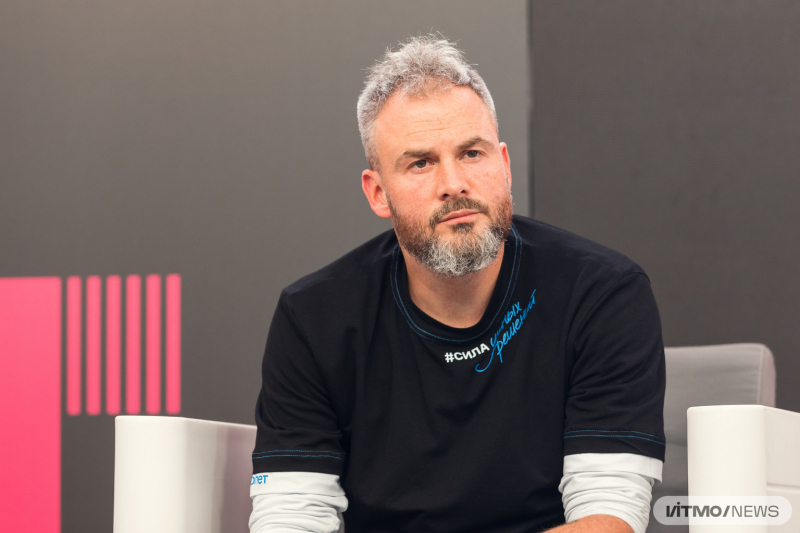
Anton Elistratov. Photo by Dmitry Grigoryev / ITMO.NEWS
Ivan Khlebnikov is of another opinion: waiting on graduates to become rich, influential, and willing to help the university can take years. That’s why industrial partnerships mustn’t be dismissed. And in the opinion of Andrey Glazkov, the support offered by alumni doesn’t necessarily have to be financial – it can also come in the form of time or expertise.
Choose the right partners and projects. According to Ivan Khlebnikov, not every company is a good partner for a university. First of all, it must operate on the frontier of its own subject area. Secondly, even short-term projects can be important. Thirdly, fundamental research is nothing to knock at, either: sometimes, businesses come to universities for new technological perspectives and theories when they’ve hit a dead end on a project.
Companies should invest in more than just an educational program or project. In Andrey Glazkov’s opinion, everything a student encounters in their time at university shapes them as a professional – that’s why businesses must be interested in contributing to academic infrastructure and environment. One method, as pointed out by Ivan Khlebnikov, is to establish awards and grants to reward “scientifically daring” students and research teams.
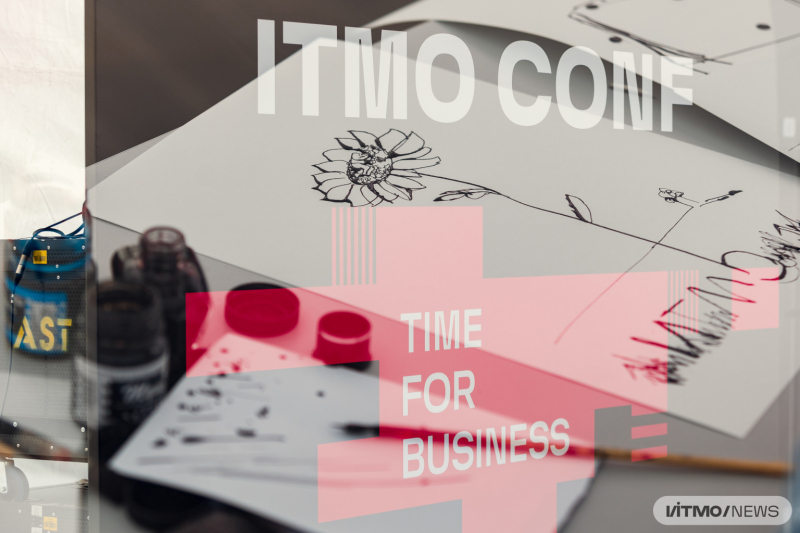
ITMO CONF 2023. Photo by Dmitry Grigoryev / ITMO.NEWS
What universities can learn from corporations
The third component of a research and educational corporation is a new approach to external and internal processes. Anton Kuznetsov, the head of ITMO’s Institute of Applied Computer Science, dedicated his talk to showcasing how this is being done at the university. Here are the key points:
- The admissions campaign should function akin to HR departments at IT companies: it’s not just about receiving and processing applications, but providing comprehensive support to applicants throughout the entire process.
- Department heads should give way to team leaders, who possess the same competencies as their team members and, if need arises, can take over their charges’ responsibilities.
- Goals and tasks should be clear, precise, and short-term.
- Operational processes should be simplified and the degree of bureaucracy is reduced.
- 20% of an employee’s working hours can be spent on activities that, though not directly related to their responsibilities, still benefit the university.
- Staff and students should be one team, as well as the university’s most valuable resource.
- A university’s services – educational programs – should be unique to the market.
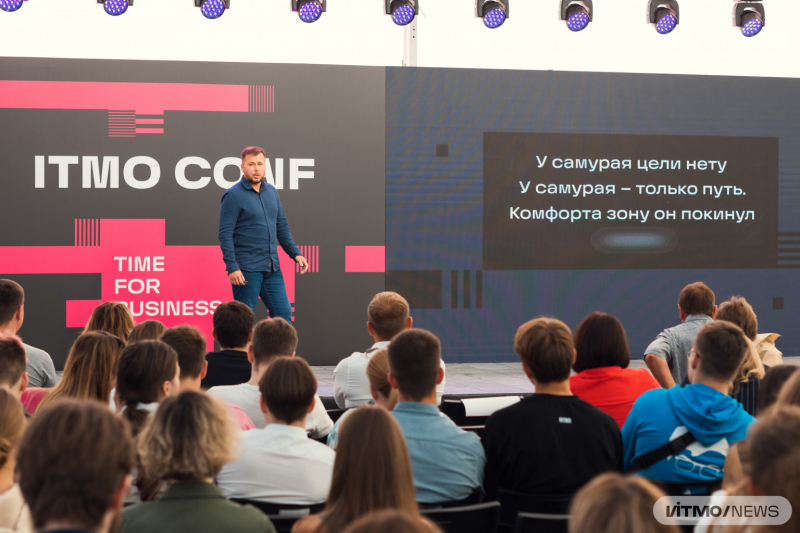
Anton Kuznetsov's talk at ITMO CONF 2023. Photo by Dmitry Grigoryev / ITMO.NEWS
What’s next?
At the conclusion of ITMO CONF, Daria Kozlova highlighted the six steps that should enable ITMO to continue providing education of the future:
- Develop partnerships with state corporations and major, medium, and small businesses.
- Create service-oriented front and back offices that can provide timely responses to inquiries and demands from various projects.
- Conduct an open competition for the establishment of ITMO Highpark infrastructure. Research groups and university departments would have the opportunity to design the campus structure.
- Transition from experience-based decision-making to data-based decision-making.
- Boost ITMO’s recognition on the entrepreneurial scene.
- Preserve and develop academic freedom.

